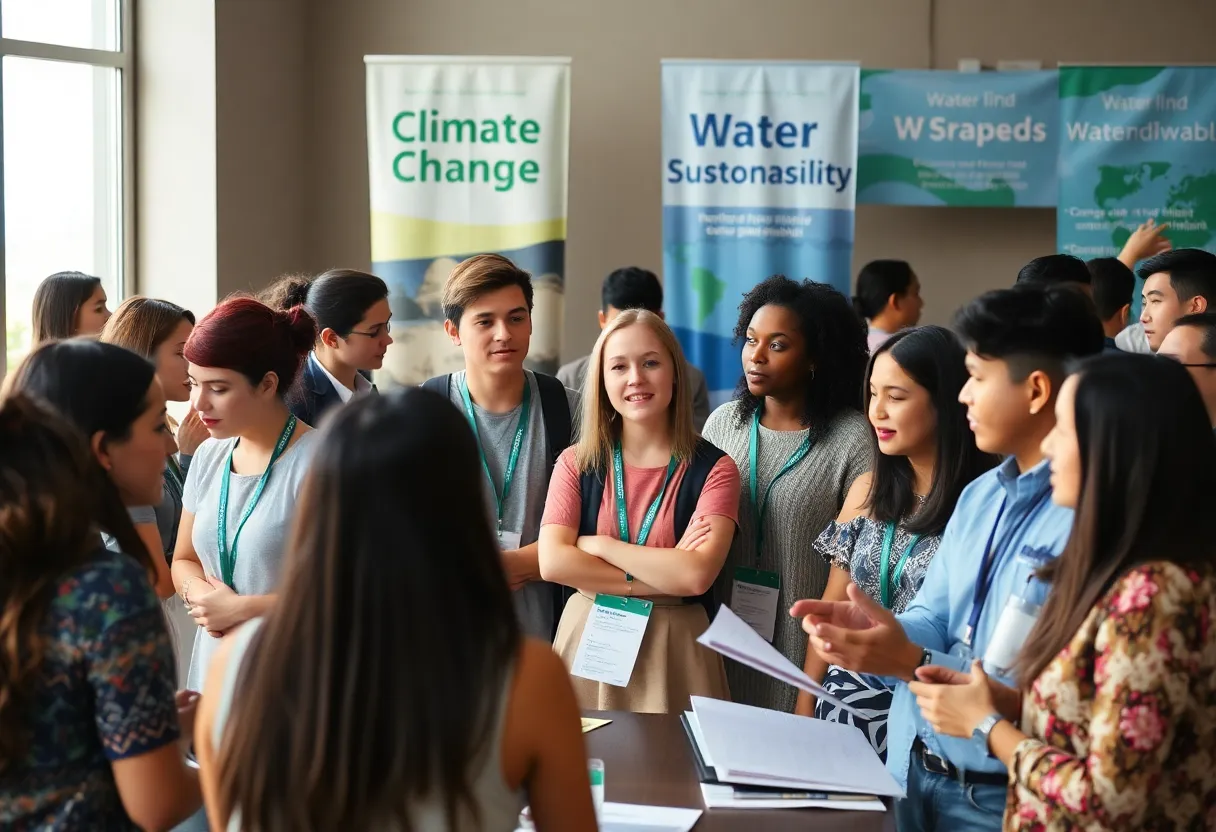Oklahoma City, October 19, 2025
The University of Central Oklahoma hosted a student-led symposium focusing on climate change’s impact on Oklahoma’s water resources. Over 300 attendees, including students, faculty, and local policymakers, gathered to discuss actionable sustainability strategies and showcase research on campus recycling initiatives. The event emphasized the need for enhanced funding for green infrastructure projects and highlighted UCO’s commitment to environmental stewardship.
Edmond, Oklahoma – Student-Led Environmental Symposium Tackles Climate Change and Water Resources at University of Central Oklahoma
Over 300 attendees gathered at the University of Central Oklahoma (UCO) for a student-led environmental symposium focused on the impacts of climate change on Oklahoma’s water resources. The event featured panel discussions, interactive sessions, and research presentations, drawing participants from faculty, students, and local policymakers in the Oklahoma City area.
The symposium highlighted practical approaches to addressing environmental challenges, with a particular emphasis on water sustainability. Attendees explored how climate change affects local water supplies, including issues like drought patterns and resource management. The event underscored the role of educational institutions in fostering community-wide solutions to these pressing concerns.
Key activities included panel discussions where experts and participants examined the intersection of climate impacts and water policy. Interactive sessions allowed attendees to engage directly with topics, such as conservation techniques and adaptation strategies. Students also presented their research on campus-based initiatives, demonstrating hands-on efforts to promote sustainability within the university environment.
Keynote Focus on Actionable Sustainability Strategies
A central highlight was the keynote address, which outlined specific strategies for advancing sustainability. These strategies encompassed methods for reducing water waste, enhancing infrastructure resilience, and integrating green practices into daily operations. The presentation emphasized the importance of collaborative efforts between educational institutions, government agencies, and local communities to implement these measures effectively.
The discussion on actionable steps aimed to equip attendees with tools to influence policy and practice at various levels. By focusing on feasible, evidence-based approaches, the keynote reinforced the potential for immediate progress in mitigating climate effects on water resources.
Student Research Showcases Campus Recycling Initiatives
Students took a prominent role by showcasing research projects centered on campus recycling initiatives. These presentations covered innovations in waste reduction, recycling program efficiency, and the broader implications for environmental health. Projects highlighted measurable outcomes, such as decreased landfill contributions and increased awareness among the university population.
The student-led efforts illustrated how academic settings can serve as testing grounds for sustainable practices. By presenting data-driven findings, participants contributed to ongoing dialogues about scalable solutions that extend beyond the campus to the wider Oklahoma region.
Conclusion and Call for Enhanced Green Infrastructure Funding
The symposium wrapped up with a collective push for increased funding toward green infrastructure projects. This call to action stressed the need for investments in systems that support water conservation and climate resilience, such as improved stormwater management and eco-friendly urban planning.
This emphasis aligned with broader goals of environmental protection, urging stakeholders to prioritize resources for long-term benefits. The event’s conclusion reaffirmed UCO’s position as a leader in environmental education and advocacy, particularly in addressing regional water challenges.
Broader Context of UCO’s Environmental Commitment
Located in the heart of Oklahoma City, UCO has consistently prioritized initiatives that promote environmental stewardship. The university’s programs often integrate sustainability into its curriculum and campus operations, reflecting a dedication to preparing students for real-world environmental issues.
This symposium builds on previous efforts, such as ongoing research into local ecological concerns and partnerships with regional organizations. By hosting events like this, UCO facilitates knowledge exchange that benefits both the academic community and the surrounding area.
The gathering of diverse participants, including faculty, students, and policymakers, created a platform for meaningful dialogue. It highlighted the urgency of addressing climate change’s effects on water resources, a critical issue for Oklahoma’s future.
Overall, the event demonstrated the power of student-driven initiatives in driving environmental awareness and action. With over 300 people involved, it served as a catalyst for continued collaboration on sustainability frontlines.
Significance for Oklahoma’s Environmental Landscape
Oklahoma faces unique challenges related to water scarcity and climate variability, making events like this symposium especially relevant. The discussions provided insights into how local actions can contribute to state-level resilience. By focusing on education and innovation, UCO is helping shape responses to these challenges.
The symposium’s outcomes may influence future policies and projects, encouraging a more sustainable approach to resource management across the state. This aligns with national trends in environmental education, where universities play a key role in community empowerment.
In summary, the University of Central Oklahoma’s environmental symposium offered a comprehensive look at climate change’s impact on water resources, blending education, research, and advocacy for lasting change.
FAQ
What was the main topic of the student-led environmental symposium at the University of Central Oklahoma?
The main topic was the impacts of climate change on Oklahoma’s water resources.
How many attendees participated in the symposium?
Over 300 attendees, including faculty and local policymakers, participated in the event.
What types of activities were included in the symposium?
The event featured panel discussions, interactive sessions, and student research presentations.
Who delivered the keynote address at the symposium?
The keynote speaker was Dr. Elena Vasquez from the EPA.
What did the keynote address cover?
The keynote outlined actionable strategies for sustainability.
What did students showcase during the event?
Students showcased research projects on campus recycling initiatives.
How did the symposium conclude?
The event concluded with a call for increased funding for green infrastructure.
What does the symposium reinforce about the University of Central Oklahoma?
The symposium reinforces UCO’s dedication to environmental stewardship in the heart of Oklahoma City.
Key Features of the UCO Environmental Symposium
| Feature | Description |
|---|---|
| Main Topic | Impacts of climate change on Oklahoma’s water resources |
| Attendance | Over 300 attendees, including faculty, students, and local policymakers |
| Activities | Panel discussions, interactive sessions, and student research presentations |
| Keynote Speaker | Dr. Elena Vasquez from the EPA |
| Keynote Content | Actionable strategies for sustainability |
| Student Contributions | Research projects on campus recycling initiatives |
| Conclusion | Call for increased funding for green infrastructure |
| UCO’s Role | Dedication to environmental stewardship in Oklahoma City |
Deeper Dive: News & Info About This Topic
HERE Resources
Oklahoma State Fair Concludes with Economic Impact





